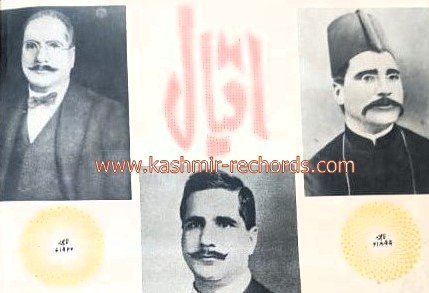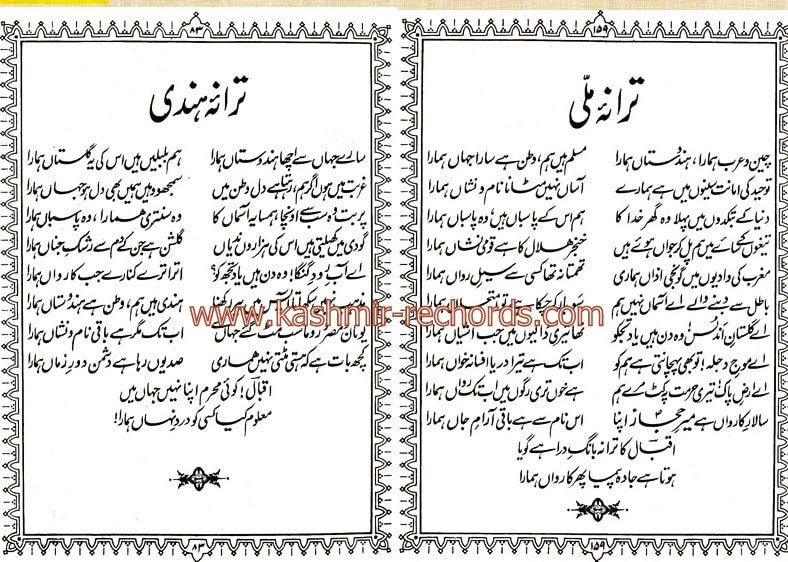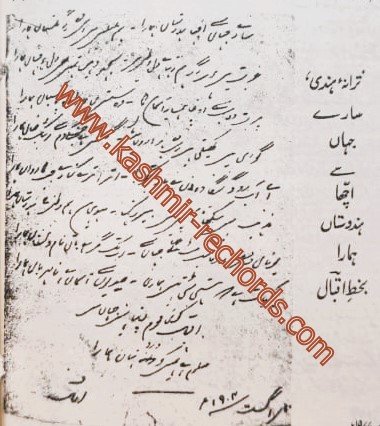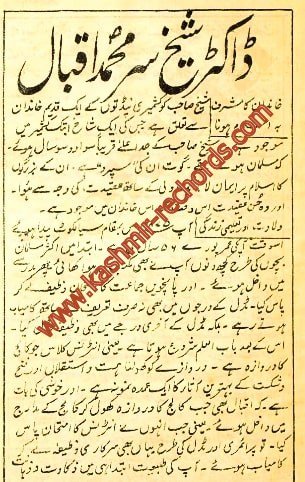(Kashmir Rechords Independence Day Special)
“Saare Jahan Se Achha Hindustan Hamara” is a foundational patriotic poem, penned by Muhammad Iqbal in 1904. Originally written for children and published in the weekly journal Ittehad on 16 August 1904, the poem was later recited by Iqbal at Government College, Lahore. Celebrating India’s beauty and cultural richness, it became deeply ingrained in the Indian consciousness and was included in Iqbal’s Urdu anthology Bang-i-Dara (1924). Over a century later, it remains a popular and cherished anthem in India. The verses were often sung by Mahatma Gandhi and were later adapted into a marching tune by sitar maestro Pandit Ravi Shankar.

Paradoxical Shift
By 1910, merely five years after penning down Sare Jehan Se Acha Hindustan Hamara , ( Also known as Tarana-e-Hindi), Iqbal’s view had undergone a tectonic shift. His early secular and nationalistic outlook evolved into a more global and Islamic perspective. This shift is evident in his poem “Tarana-e-Milli,” written in the same metre as “Saare Jahan Se Achha,” where the focus shifts from the homeland of Hindustan to a broader Islamic identity. The line “Muslim hain hum, watan hai saara jahaan hamara” (We are Muslims, the whole world is our homeland) exemplifies this change in his philosophical and political outlook.

Despite this shift, “Saare Jahan Se Achha…..” remains a cherished patriotic song in India, frequently performed at national events, in schools, and by the armed forces. The popular version by Pandit Ravi Shankar, now the Indian Armed Forces’ quick march, underscores its lasting significance, even though some lines have been omitted. The poem’s legacy extends beyond India. In 1984, Astronaut Rakesh Sharma used its lines to describe India from space during a live broadcast with Prime Minister Indira Gandhi.

Eyesore for Pakistan
Iqbal, who passed away on April 21, 1938, is revered as Pakistan’s national poet. However, “Saare Jahan Se Achha Hindustan Hamara” remains a contentious symbol there. The poem is an “eye-sore” for Pakistan, as they cannot deny its creation by Iqbal nor comfortably recite it in their land. So is the case with his “Tarana-e-Milli’’, that talks about China, Arab and other areas that do not fit into present global scheme of things.
Kashmir Rechords from its rare archival records is sharing “Sare Jehan Se Acha’’ written in Iqbal’s own handwriting.

Iqbal’s poetic journey reflects a profound transformation. His ancestors were Kashmiri Pandits from the Saproo dynasty who had moved to Sialkot many years ago. His shift from cherishing Hindustan to envisioning a broader Islamic unity within a few years of writing “Saare Jahan Se Achha” illustrates his evolving philosophical and political landscape. Despite his ideological shift, India continued to respect his poetry, with many institutions still named after him, such as the Library of Kashmir University in Srinagar. “Saare Jahan Se Achha” endures as a powerful emblem of national pride and unity in India, where it is sung on every National Day.

Iqbal’s journey from celebrating the unity of Hindustan in “Saare Jahan Se Achha” to promoting a global Islamic identity in “Tarana-e-Milli” underscores the evolution of his philosophical and political beliefs, reflecting the complex interplay between nationalism and religious identity in the subcontinent’s history. “Saare Jahan Se Achha” remains a beloved patriotic anthem in India, performed across the nation on significant occasions, embodying the enduring spirit of national pride and unity.